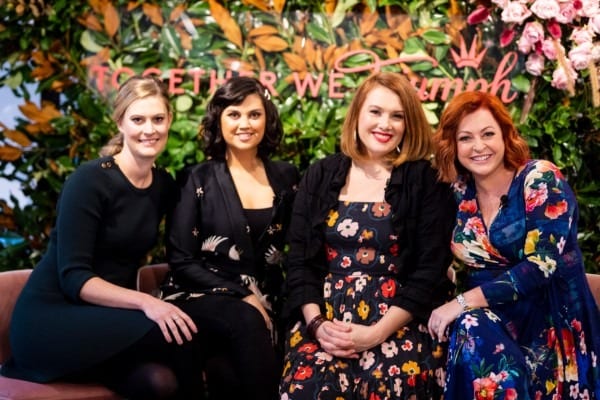Recently I sat down with author, presenter and journalist Jamila Rizvi at an event hosted by Triumph where Clare Bowditch, Shelly Horton and Rizvi spoke about their own trials, tribulations and triumphs.
It turned out Rizvi shares my misgivings about the dreaded ‘C’ word.
“We have a very male construction about what confidence is – what it looks like and how it should look,” Rizvi says. “We have to recognise that women’s ‘lack of confidence’ isn’t something that’s inherently wrong with women.”
Despite the popular perception women are not deficient or inherently flawed.
“What has happened is women have been socialised and grown up and worked in a system that has made them feel less confident because it’s a sexist system. When the system is gendered it can start to erode [women’s] confidence.”
That’s not to say, however, there isn’t value in working to boost your own confidence.
“There are absolutely good reasons to work on it – you can be more effective with more confidence – but we have to be really careful about the language we use and the tendency we have to frame this as a deficiency on the part of women rather than saying ‘The structures of our economy make you feel like you don’t belong in workplaces – certainly not at the top’,” she says. “We need to work on communicating that women absolutely do [have what it takes] and we have to find ways to reimagine confidence to something that can be a feminine trait as well.”
She describes her own confidence as a “work in progress”. On finishing school and university Rizvi says she was ‘incredibly confident’, something she attributes in part to an educational environment that favours girls.
“If anything I came out of school full of confidence, arrogant and even cocky,” she says. “But the workplace hits hard and that’s a familiar tale. Through school girls are told they’re just as good as the boys and can do anything and when they get to work they realise very quickly that isn’t true.”
Almost two years ago Rizvi’s confidence in a very different realm was hit.
“I was diagnosed with a brain tumour and initially my mental health was the worst it has ever been,” she says. “Those first few months immediately after diagnosis were the hardest of my life, far harder, I have to say, than even the physical recovery of surgery.”
The shock and uncertainty was rattling.
“Any fear of death I felt was way back on the shelf as something I could worry about when I was 90 and then it was right in front of me at age 31. My physical security was absolutely shattered.”
Fortunately, one unexpected benefit was that it had the effect of boosting Rizvi’s confidence, particularly about work.
“I think [that happened] because it put other fears into perspective. My fears about work or my anxieties about whether someone liked me – started to feel less important than what I was dealing with so it injected some confidence in other areas.”
In more ways than one, work remained a welcome haven during a pretty torrid storm.
“Everyone advises you to pull back from work when you get sick. Everyone is different but for me that would have been the worst possible thing,” she says. “Work made me feel normal, it gave me a purpose and it reminded me that I had something to do in the world that was not just managing illness.”
To the degree it was possible Rizvi leaned further into her career.
“It has been really important to keep me sane and level and more comfortable. Work has been a haven because it’s given me a reason not to just worry about the next brain scan or eye test.”
Her doctors have been encouraging of her keeping her mind occupied.
“They have said ‘If this makes you feel good, then you should keep doing it’,” Rizvi says. “There is a period after brain surgery where work is absolutely not possible but when the motivation returned – for me usually a few weeks after each surgery – I found it really useful. It took the focus off me and my illness.”


